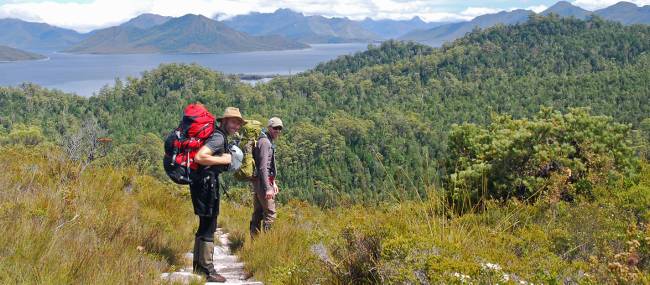
Trekking toward Lake Pedder | Chris Buykx

Every year we guide hundreds of travellers on treks around Tasmania’s remote wilderness, and one of the main things that influences how much you enjoy your experience is not while you are on the trip- but what you do in the months leading up to it. That’s right: Trek training! We’ve created a 6 month trek training guide for a moderately graded trek, such as the
Overland Track, or the
Walls of Jerusalem Circuit, or mainland treks such as the
Larapinta Trail or
Jatbula Trail.
Top tip:
The more time you put into trek training in the months leading up to your trip, the more you will enjoy your experience and safely complete your wilderness trek. Trek training is more than just walking; it’s preparing the body for the increased intensity of undulation, terrain, pack weight, kilometres walked and overall endurance.
6 months out
If you have limited experience trekking long distances, we recommend you slowly condition your body to walking from 6 months out. Start with a simple physical preparation regime like a walking program, walking three to four days a week on level ground, up to 40 minutes at a time. Consider walking to the shops, short bushwalks or coastal walks during the week and on weekends.
5 months out
Maintain walking three to four days a week, however start to include hills and stairs to your walking regime. To condition your body to some of the steep hills you may experience on your trek, choose hills that are steep or have a higher incline. It is also a good idea to begin walking on uneven grass or rocky paths to help you get used to uneven ground and surfaces. This terrain can be slightly more difficult than a concrete footpath, however will help you strengthen the muscles of your lower limbs. Walk for a minimum of one hour at a faster pace than what you’re accustomed to. Moderately graded adventures require you to carry a full pack up to 18kgs, so during your trek training you will need to prepare your core and back to carry your pack. Introduce core-building exercises to your regime, such as sit ups or planks, and carry a light backpack with you on these walks.
4 months out
If you live near the coast, start to walk along the beach on your training walks. Do not walk along the hard, compact sand close to the water’s edge, but seek out the loose, soft sand away from the water. This sand mimics muddy tracks and strengthens your leg muscles. Carry your backpack while walking and increase your walking time to 1.5 hours.
3 months out
Increase your walking routine to five days a week and walks for a minimum of 1.5 hours each time. You should aim to increase the weight of your backpack by 0.5kg every week, and try to find steeper hills and stairs to increase the difficulty level. When walking up stairs, alternate between single steps and double steps to condition you for uneven stairs and surfaces on your trek.
2 months out
By now you should be accustomed to walking on all terrain, including steep hills and stairs, uneven surfaces and soft sand. Increase your walking duration to 2-3 hours every day for the entire week (that’s right, even if it rains!). By doing this, you are mentally preparing for your multi-day walk. We’ve found that the hardest part of a multi-day trek is not any individual day’s walk; but knowing that you have to wake up the next day and do it again, so it’s important to prepare yourself mentally for this in the lead up to your trek. Add weight to your backpack until it weighs between 18-20kg. The aim here is to exceed the weight you intend to carry during the actual trek. While training, use the hiking boots and gear that you will use during the real trek. This will help you ascertain whether they are the right fit, whether they give you blisters and if you need other socks or shoe inserts to add comfort where possible. You should have a hydration system in place now, whether it is 3 x 1L water bottles, or a Camel Back system. Practice drinking as you walk on your training walks.
1 month out
Continue with your training but reduce the intensity to avoid a burnout – the last thing you want to do is get an injury a week into the trek! In the week before your trek, reduce back to some light walking with occasional hill climbing - but don’t be too hard on yourself. Also, reduce your alcohol intake one week before the trek as it impairs your performance (set that aside for you celebratory dinner after you complete the trek!).
Ready and raring to go? Check out some of our
moderate and challenging treks and start planning for your next multi day trek.